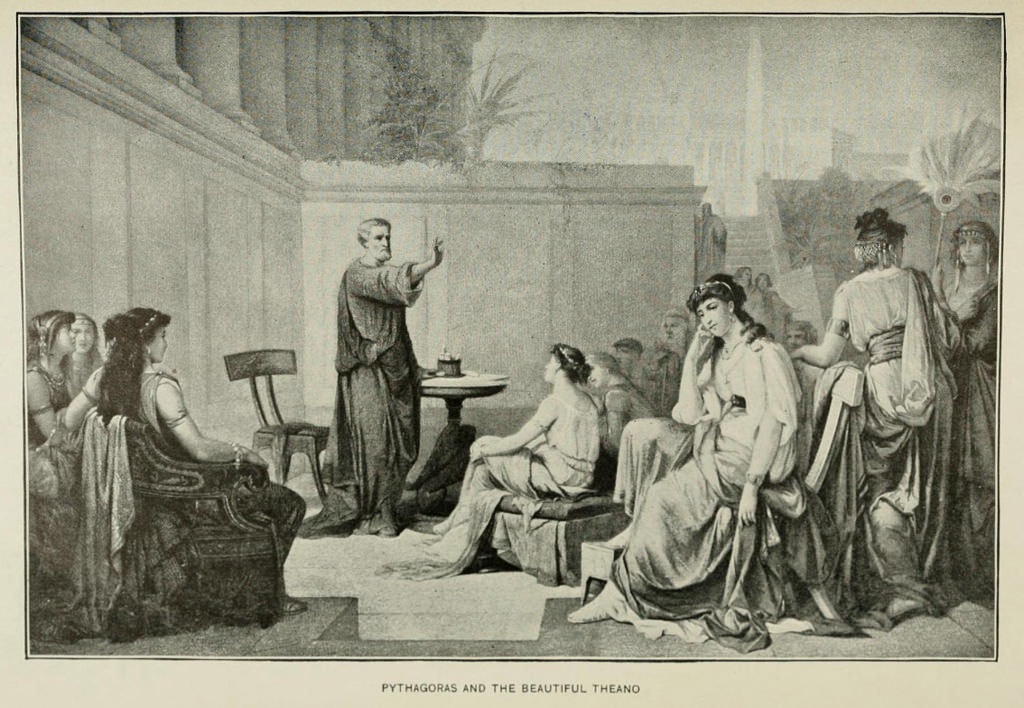|
Pythagoras' theorem is the first thing that comes to our mind when Pythagoras is mentioned. However, although this theorem is very important and represents one of the fundamental principles of geometry, Pythagoras' significance is far greater. Despite the great importance of Pythagoras, there is little reliable data about his life. Over time, stories about Pythagoras got elements of a myth and it is hard to decide what are the real historical facts. Pythagoras was born c. 570 BC on the Greek Island of Samos, his father was a merchant and he traveled a lot in his young age. However, c. 532 BC Pythagoras had to emigrate to Crotone (southern Italy) probably because of the tyrannical rule in Samos. Before the expansion of Rome, the Southern Italy and Sicily were inhabited by Greeks and the whole region was known as Magna Graecia – Great Greece. The Greeks founded the first colonies in Italy during the 8th century BC and even today there are some descendants of the Ancient Greeks in Italy that speak Griko, a distinctive dialect of the Greek language but mutually intelligible with the Modern Greek.
The city of Crotone and the Magna Graecia became a new opportunity and Pythagoras established his ethico-political academy in form of a brotherhood. The disciples of Pythagoras are known as Pythagoreans and they continued to develop the ideas of their founder. None of Pythagoras’ writings survived and it is hard to tell what was his real teaching. After his death, the Pythagoreans cited many ideas as ideas of their teacher because of the great admiration they felt for him. There is no doubt that Pythagoras had enormous authority not only among his disciples but also throughout the Greek world. The Pythagoras’ school was at the same time a religious sect and that differs a lot from today’s prejudices of mathematicians as pure rationalists. Pythagoreans led their lives under very strict rules. They had to wear special clothes, eat special food and were obliged to help one another. Common activities of Pythagoreans involved astronomy, mathematics, and music. Moreover, they believed that this way of life provides them with bliss not only in this but also in the next life. According to Pythagoreans, every human soul is immortal and they believed in metempsychosis, transmigration of the soul, similar to reincarnation belief. Their ethic was considerably different for that time and they considered woman as equal to man and women could become a part of their community. Also, they were very kind to their slaves. Over time, the Pythagorean brotherhood has become numerous and Pythagoras and his disciples gain a very important political role. However, they were conservative and supported the aristocracy and therefore suffered the persecution of supporters of democracy. Their houses were burned many times, and there were attempts to completely destroy their community. In 509. BC Pythagoras had to flee from Croton to Metapontum (today’s Metaponto in Italy) where he died in 494 BC. Pythagorean communities were established in many Greek cities inspired by Croton school and Pythagoras’ teaching spread all over the Greek world. Pythagoreanism continued to exist for several centuries after Pythagoras' death and significantly influenced ancient Greek and Medieval philosophers.
0 Comments
Leave a Reply. |
AuthorPhoenix Voyagers Archives
January 2023
Categories |
|




 RSS Feed
RSS Feed




